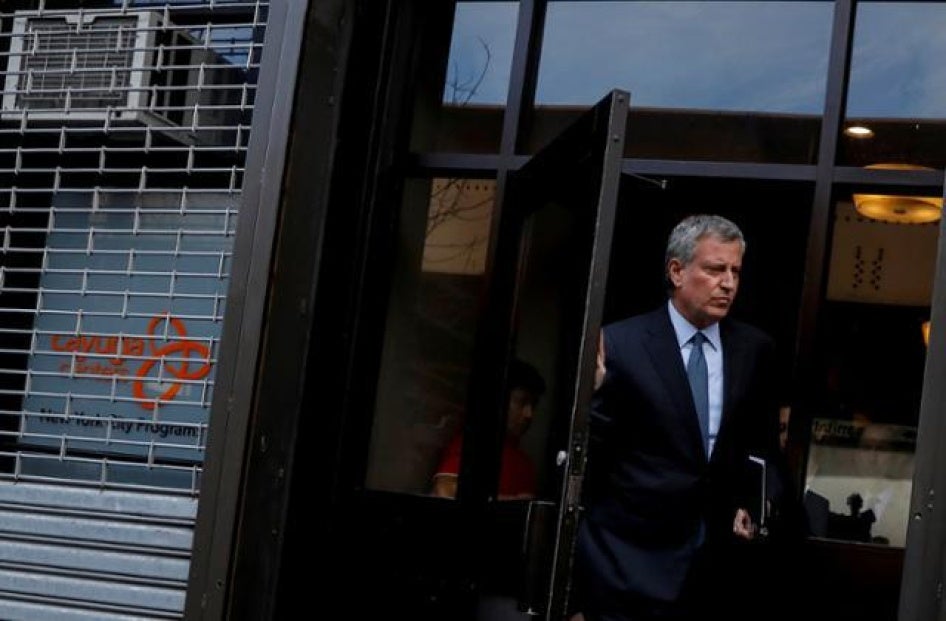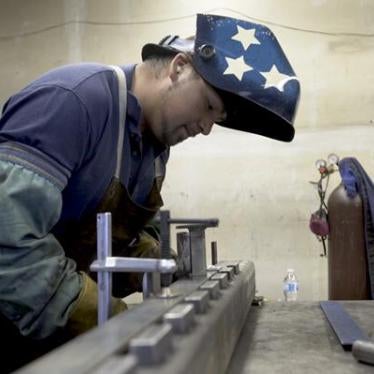“Alisha” was 21 years old when her abusive older boyfriend forced her to work as his drug mule. When she was arrested for drug trafficking, she pled guilty. She was afraid to tell her attorney the truth because her boyfriend had threatened to kill her and her family if she did.
As an undocumented immigrant, Alisha was ordered deported because of her criminal history. For the past four years, she has been working with her lawyers to fight to remain in the United States with her three children, who are U.S. citizens. She now has an opportunity to obtain immigration relief — but a new de Blasio administration policy has left her in limbo because her attorneys are unsure whether they can continue to work on her case.
Under federal law, immigrants in deportation proceedings or at risk of deportation are not guaranteed access to a lawyer, leaving those who cannot afford one at a huge disadvantage. New York City is filling this gap by funding organizations so they can provide low-income immigrants like Alisha access to free legal services.
De Blasio’s administration has invested approximately $31 million in immigrant legal services this fiscal year, making it the largest funder for these services in New York City.
Despite this impressive investment, however, the city is restricting its funding and denying help to many of the people who need these services the most. That’s because the city bars immigrants with certain felony convictions, like Alisha, from accessing city-funded legal services. The administration has been quietly inserting this language into contracts with legal service providers since late last year.
This change, referred to by the city as the criminal carveout, comes at a time when President Trump has instructed U.S. Immigration and Customs Enforcement (ICE) and to treat all undocumented immigrants as a priority for deportation. In my research for a new report on the subject, I learned that those with felony convictions are immigrants with the most complex cases, who often have the greatest need for competent counsel.
The policy will devastate families like Alisha’s, but the ripple effects are far larger. I spoke to 10 immigrant legal services providers that receive city funding, three of which rely exclusively on city funding and will need to turn away clients with disqualifying convictions, even though they may be survivors of abuse like Alisha. All 10 providers said that the carveout is likely to increase the amount of misinformation and fear in immigrant communities and create a chilling effect, preventing those who may be eligible from seeking out their services. These effects are likely to affect far more people than the relatively small number of clients who the carveout will formally exclude.
Danielle Alvarado, staff attorney at the Community Development Project, told me, “This carveout poisons the relationship with clients.” Attorneys and their organizations have worked hard to build trust with immigrant communities. If they start turning clients away, those individuals may not understand the complexities of the criminal carveout and spread misinformation about the organization and whom they do or do not serve. If immigrants are hesitant to seek resources or services from organizations then they may end up in the hands of fraudulent attorneys who charge thousands of dollars for filing fake documents.
Ironically, the very same de Blasio administration has expanded reentry services for everyone in city jails. This expansion provides vocational, educational and therapeutic programming to ensure that those in city custody do not ever return there. When announcing the program, de Blasio said “everyone deserves a second chance.” But his immigrant legal aid carveout denies immigrants a second chance by excluding those who need it the most.
The mayor’s Office of Immigrant Affairs argues that its policy represents the administration’s priorities in light of funding limitations. I spoke to providers who told me this logic makes no sense to them. Immigrants with these felony convictions are a small number of the clients they represent, so excluding them will not free much funding for other cases.
At a time of increased fear and uncertainty for immigrants across the country, de Blasio’s policy change endangers the progress New York City has made in supporting immigrant communities. Excluding the most vulnerable immigrants from legal services will tear apart families and destroy the trust that organizations have built with immigrant communities. Mayor de Blasio should end the criminal carveout and prove that this is a city of immigrants — with no exclusions.










